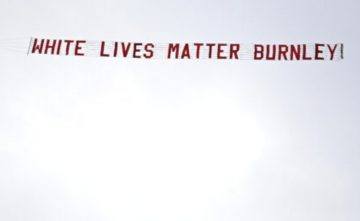Kenan Malik in Prospect:
 “White Lives Matter Burnley!” ran the banner trailed by a plane above the Etihad stadium, Manchester City’s ground, during a match with Burnley in June. Since the Premier League resumed after the coronavirus hiatus, players and officials have “taken the knee” at the start of matches in solidarity with the Black Lives Matter movement against racism and police brutality.
“White Lives Matter Burnley!” ran the banner trailed by a plane above the Etihad stadium, Manchester City’s ground, during a match with Burnley in June. Since the Premier League resumed after the coronavirus hiatus, players and officials have “taken the knee” at the start of matches in solidarity with the Black Lives Matter movement against racism and police brutality.
The stunt was roundly condemned by almost everyone: Burnley captain Ben Mee, football administrators, and most people in the Lancashire town, black, Asian and white. Yet if the banner drew near-universal opprobrium, implicit in the slogan were several themes that resonate more widely today—the claim that the needs of white people are being ignored, the notion of white victimhood and the growing significance of “white identity.”
Even a decade ago, discussions of “white identity” belonged to the fringes of politics. It was Nazi-speak. Today it has become a significant political issue on both sides of the Atlantic. In Britain, the debate about the so-called “left behind” has focused mainly on the travails of the “white working class.” Many commentators bemoan the way that traditional working-class culture and heritage has been eroded by mass migration. There has been growing interest in the problems facing certain poor towns, many of which remain overwhelmingly white.
More here.
